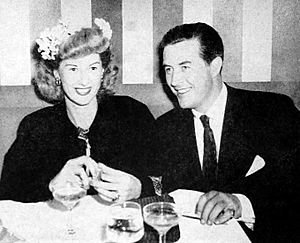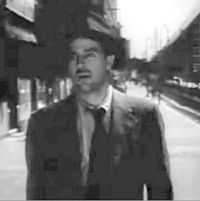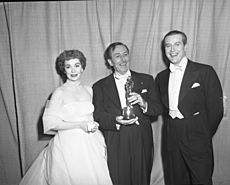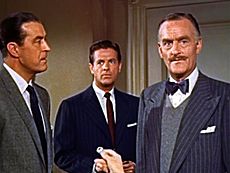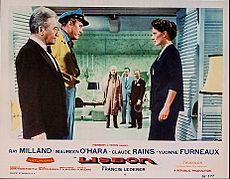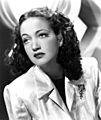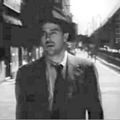Ray Milland facts for kids
Quick facts for kids
Ray Milland
|
|
|---|---|
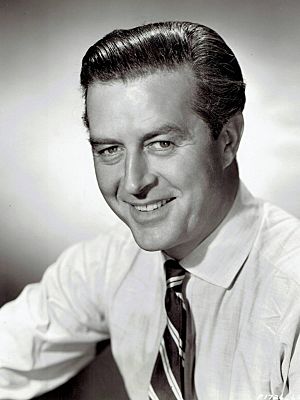
Milland in 1947
|
|
| Born |
Alfred Reginald Jones
3 January 1907 Neath, Glamorgan, Wales
|
| Died | 10 March 1986 (aged 79) Torrance, California, U.S.
|
| Occupation |
|
| Years active | 1929–1985 |
| Political party | Republican |
| Spouse(s) |
Muriel Weber
(m. 1932) |
| Children | 2 |
Ray Milland (born Alfred Reginald Jones; 3 January 1907 – 10 March 1986) was a famous Welsh-American actor and film director. He acted in movies and TV shows from 1929 to 1985. He is best known for his award-winning role in the movie The Lost Weekend (1945). He also starred in Reap the Wild Wind (1942), Alfred Hitchcock's Dial M for Murder (1954), and Love Story (1970).
Before becoming an actor, Milland served in the Household Cavalry of the British Army. He was very good at shooting, riding horses, and flying airplanes. He left the army to become an actor. He started with small roles in British films. His first big part was in The Flying Scotsman (1929). This led to a contract with MGM in the United States.
After working for MGM, Milland joined Paramount. He played many English characters. He became a big star after the success of Three Smart Girls (1936) and The Jungle Princess (1936) with Dorothy Lamour. Ray Milland worked with Paramount for almost 20 years. He also directed films and acted on television. He co-starred with many popular actresses like Grace Kelly and Lana Turner.
Contents
Early Life and Army Days
Ray Milland was born Alfred Reginald Jones on 3 January 1907 in Neath, Wales. His father, Alfred Jones, was a steel mill superintendent. Ray went to private schools, including King's College School in Cardiff. He also worked on his uncle's horse farm. He left home when he was 21.
Serving in the Household Cavalry
Before acting, Milland was a soldier in the Household Cavalry. He was an excellent shot and joined his company's rifle team. He won many shooting contests, including the Bisley Match in England. He also won the British Army Championship for both pistol and rifle shooting.
While in London, Milland met dancer Margot St. Leger. She introduced him to American actress Estelle Brody. Brody made Milland think about his army career. In 1928, he decided to leave the army to become an actor.
Becoming an Actor
First Roles
Ray Milland's first time on film was a small, uncredited role in Piccadilly (1929). After some more small jobs that didn't even make it to the screen, he found a talent agent.
His shooting skills helped him get work as an extra at British International Pictures. He worked on The Informer (1929). While there, he was asked to try out for another movie. The director, Castleton Knight, liked him. Milland got his first real acting role as Jim Edwards in The Flying Scotsman (1929). On this movie set, someone suggested he use a stage name. He chose "Milland" from the "mill lands" area of his hometown, Neath.
Because of The Flying Scotsman, he got a six-month contract. He starred in two more films directed by Knight: The Lady from the Sea and The Plaything (both 1929). Milland felt his acting wasn't great and that he got roles only because of his looks. So, he decided to get stage experience to improve. He joined a touring play called The Woman in Room 13. Even though he left the play after five weeks, he felt he learned a lot.
Moving to Hollywood
Between plays, MGM offered Milland a nine-month contract. He would earn $175 a week in Hollywood. He accepted and moved to the United States in August 1930. MGM used him for small speaking parts in their movies.
His first Hollywood film was Son of India (1931). The director was very critical of his acting. Despite this, studio bosses convinced Milland to stay. In 1930, he appeared in his first US film, Passion Flower. For the next two years, he had minor roles for MGM and Warner Bros.. His biggest part was as Charles Laughton's nephew in Payment Deferred (1932).
During this time, Milland met Muriel Frances Weber, whom he called "Mal." She was a student at the University of Southern California. They married on 30 September 1932. They had a son, Daniel, and adopted a daughter, Victoria.
After Payment Deferred, MGM did not renew his contract. Milland struggled to find work in the US. He decided to return to Britain, hoping his Hollywood experience would help him get roles there.
Back in Britain and Return to the US
Life in Britain was hard, and he found little steady work. He got parts in two British films, This is the Life and Orders Is Orders (both 1933). Neither was a big success.
In 1933, changes in the US banking system made it cheaper for Milland to return to the United States. He moved back to California. With few acting jobs, he took on odd jobs, even working for a bookie. He almost took a job as an assistant manager at a gas station.
But on his way back from that interview, he passed Paramount Pictures. A casting director, Joe Egli, stopped him. Paramount was filming Bolero (1934). Another British actor was hurt, and they needed a quick replacement. Egli offered Milland a two-week contract, paying ten times more than the gas station job. Milland took the acting role.
After Bolero, he got another short contract for We're Not Dressing (1934). The director, Norman Taurog, was very impressed with Milland. He suggested that Paramount offer Milland a long-term contract. Milland signed a seven-year deal with Paramount, starting at $175 a week. This gave him a steady income, and he and Muriel moved into a new apartment. Milland later said, "It all happened by luck and I was just there at the right place at the right time."
Paramount and The Jungle Princess
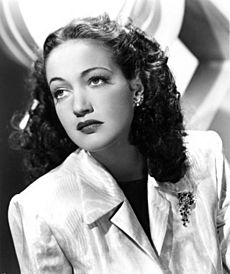
At first, Paramount used Milland for speaking roles, but not as a main star. He had a supporting role in The Glass Key (1935).
He was loaned to Universal for Next Time We Love (1936) with James Stewart. Back at Paramount, he appeared in The Return of Sophie Lang (1936) and The Big Broadcast of 1937 (1936).
Then, Joe Pasternak asked him to be the lead in his new film, Three Smart Girls (1936). Paramount agreed to lend Milland to Universal for this movie.
When he returned to Paramount, Milland helped test new actresses for The Jungle Princess (1936). The studio chose Dorothy Lamour. Lamour wanted Milland to be her co-star. Paramount wasn't sure, but when Three Smart Girls became a huge hit, they gave Milland the role. By the end of 1936, Milland was considered for main roles. Paramount rewrote his contract, tripling his salary.
Becoming a Movie Star
Leading Man Roles (1937–1939)
After a trip to Europe, Milland played Captain Hugh "Bulldog" Drummond in Bulldog Drummond Escapes (1937).
He then starred in Wings over Honolulu (1937) and Easy Living (1937), a classic comedy with Jean Arthur.
Milland made Ebb Tide (1937) and was loaned to RKO for Wise Girl (1937).
Back at Paramount, he reunited with Lamour in Her Jungle Love (1938) and Tropic Holiday (1938). He also did a military drama, Men with Wings (1938).
Milland made a comedy, Say It in French (1938), and then Hotel Imperial (1939) with Marlene Dietrich. During this film, Milland had a serious accident. While riding a horse for a scene, his saddle came loose. He was thrown into a pile of broken bricks. Milland woke up in the hospital with a badly hurt left hand, a cut on his head, and a concussion.
After he recovered, he played John Geste in Beau Geste (1939). He starred alongside Gary Cooper and Robert Preston. The film was a big success. 20th Century Fox then borrowed him for Everything Happens at Night (1939).
Milland had another injury to his left hand in 1939. He enjoyed flying planes, but Paramount made him stop. So, he took up woodworking. While using a circular saw, he slipped and cut his hand. He lost part of his thumb and damaged tendons. He believed his hand was only 50% usable after this. Despite the injury, he flew to Britain to film French Without Tears. By the time he returned to America, World War II had begun in Europe. That year ended with the news that Muriel was expecting their son, Daniel.
World War II Era Films
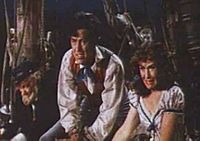
In 1940, Milland appeared in romantic comedies and dramas. These included Irene, The Doctor Takes a Wife, Arise, My Love, and Untamed.
When the United States entered World War II, Milland tried to join the U.S. Army Air Forces. But he was rejected because of his injured left hand. He worked as a civilian flight instructor for the Army. In 1944, he toured with a United Service Organisation (USO) group in the South Pacific.
As the war continued, Milland starred in more action movies. He played a pilot in I Wanted Wings (1941). This was followed by Skylark (1942) and two films with Paulette Goddard: The Lady Has Plans (1942) and Cecil B. DeMille's Reap the Wild Wind (1942) with John Wayne. Milland's name was listed before Wayne's in the credits.
Milland starred in Are Husbands Necessary? (1942) and then Billy Wilder's first film as director, The Major and the Minor (1942) with Ginger Rogers.
He appeared in the musical Star Spangled Rhythm (1943), singing "If Men Played Cards as Women Do." He also made an appearance in Forever and a Day (1943).
He and Goddard then made The Crystal Ball (1943). After that, he was Ginger Rogers' co-star in Lady in the Dark (1944).
In 1944, Milland starred in The Uninvited, a supernatural horror film. It was known for its serious look at ghosts. He then starred in Fritz Lang's Ministry of Fear (1944).
He also toured war zones with USO Shows. When a soldier asked why he wasn't in the army, Milland joked, "With a war on? Are you crazy?"
The Lost Weekend: A Major Success (1945)
The biggest moment in Milland's career was starring in The Lost Weekend (1945). Milland remembered getting the script with a note saying, "Read it. Study it. You're going to play it." He found the story difficult and felt it would need "serious acting," which he thought he hadn't done before. The film was produced by Charles Brackett and directed by Billy Wilder. Milland had worked with both of them before and was excited.
Milland worried he might overact in the role of Don Birnam. To prepare, he spent a night in a psychiatric ward at Bellevue Hospital. He found it very unsettling and left early. Milland lost eight pounds for the role and talked with the book's author, Charles R. Jackson, to understand the character better. He later said this was the only role he was "really proud of."
After filming The Lost Weekend, Milland worked on Kitty (1945) with Paulette Goddard. He then made the romantic comedy The Well-Groomed Bride. Many crew members from The Lost Weekend also worked on this film. A sound mixer told Milland he would surely be nominated for an Academy Award and probably win. Milland hadn't thought about an award, but then he hoped for it.
When The Lost Weekend was released in New York, the good reviews surprised everyone. Milland was highly praised. He won the Academy Award for Best Actor, the Golden Globe Award for Best Actor–Drama, the Cannes Film Festival Award for Best Actor, and other awards. He was the first Welsh actor to win an Oscar. His acceptance speech was one of the shortest ever.
Milland's success in The Lost Weekend led to a new contract. He became Paramount's highest-paid actor. When the film opened in Europe, Milland traveled to attend each premiere. In Cardiff, Wales, he was given the keys to the city.
Post-Oscar Career (1945–1950)
Milland continued as a leading man after his Oscar win. He stayed with Paramount until the early 1950s. He starred with Teresa Wright in The Imperfect Lady (1946). He replaced Alan Ladd in the Western California (1947) with Barbara Stanwyck, which was a big hit.
Milland reunited with Wright in The Trouble with Women (1947). He then starred with Marlene Dietrich in Golden Earrings (1947). He made a cameo in Variety Girl (1947) and then went to England for So Evil My Love (1948).
Milland made another film with director John Farrow, The Big Clock (1948), which is still highly regarded. He then did Sealed Verdict (1948) and Alias Nick Beal (1949), which Milland said was his favorite film.
In July 1948, Paramount suspended him for refusing a part. Milland said it was "out of my normal natural range as an actor."
Milland then went to Fox for the comedy It Happens Every Spring (1949). He made a fourth film with Farrow, Copper Canyon (1950). After this, Milland started working more as a freelance actor.
Working with Other Studios
At Columbia, Milland starred with Rosalind Russell in A Woman of Distinction (1950). Then, at MGM, he was directed by George Cukor in A Life of Her Own (1950) with Lana Turner.
Milland was directed by Jacques Tourneur in RKO's Circle of Danger (1951). This was the only time he filmed in his home country of Wales. At MGM, he was in Night Into Morning (1951) and the comedy Rhubarb (1951).
Milland gave a strong performance in Close to My Heart (1951) at Warner Bros. He and Gene Tierney played a couple trying to adopt a child. His next films were Bugles in the Afternoon (1952) and Something to Live For (1952) with Joan Fontaine.
Milland had a contract to make one film a year with Paramount. He was wanted for The Thief (1952), but Paramount wanted him for Jamaica Run instead. They worked it out, and filming for Jamaica Run was moved. In The Thief, his role had no dialogue. He was nominated for a second Golden Globe for this film. He later said he was proud of it.
After Jamaica Run (1953), Milland went to Columbia for Let's Do It Again (1953) with Jane Wyman.
He then starred with Grace Kelly and Robert Cummings in Alfred Hitchcock's Dial M for Murder (1954).
He also starred in the CBS sitcom, Meet Mr. McNutley, from 1953 to 1955. He played an English professor. The show was renamed The Ray Milland Show in its second season. Milland directed some episodes and soon wanted to direct more movies.
At Fox, Milland starred in The Girl in the Red Velvet Swing (1955).
Directing Films
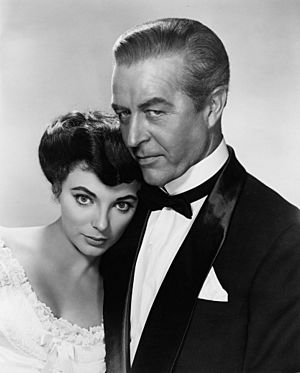
After leaving Paramount, Milland focused on directing. His first film as director was a Western called A Man Alone (1955). Milland also played the main role. He took a lower fee for the chance to direct and a share of the profits.
Milland starred in a TV show called Markheim (1956) and then starred in and directed Lisbon (1956).
He directed episodes of TV shows like The Ford Television Theatre and Schlitz Playhouse. He also starred in Three Brave Men (1956), The River's Edge (1957), and High Flight (1957).
His third film as director was The Safecracker (1958), filmed in England.
Later Career
TV Series and Return to Stage
Milland took a six-month break from acting. He then decided to go back to work. He joked that his wife told him he needed a job because he was "making her a nervous wreck" by staying home.
From 1958 to 1960, Milland starred in the CBS detective series, Markham. During the show, Milland said that acting was becoming harder for him. He said he didn't like acting but did it to make a living. He felt self-conscious during love scenes and wanted to finish quickly. The show did not attract a large audience.
He retired again in 1960, moving to the French Riviera. However, he soon got bored and started acting again.
Horror and Science Fiction Films
Milland appeared in two Roger Corman films for AIP. The first was The Premature Burial (1962). He then played Dr. Xavier in X: The Man with the X-ray Eyes (1963), which was well-received.
He also starred in and directed the science-fiction drama, Panic in Year Zero! (1962).
He continued to guest star on shows like The Alfred Hitchcock Hour, and appeared in Quick, Let's Get Married (1964).
Milland decided to return to the stage. He appeared in a touring version of My Fair Lady. In 1966, he took the lead role in the Broadway play, Hostile Witness.
The play ran in New York from February to July. Milland then took the play on tour. In 1968, he played the same role in a film of the same title, which he also directed. This was the last feature film he directed.
Character Actor Roles
He returned as a film character actor in the late 1960s and 1970s. He appeared in Daughter of the Mind (1969), a TV film that reunited him with Gene Tierney.
In the late 1960s, Milland hosted reruns of the Western series Death Valley Days. He also guest-starred on TV shows like Bracken's World and The Name of the Game. He appeared in TV movies like Company of Killers (1970) and River of Gold (1971).
Milland had a big box office success playing Oliver Barrett III in Love Story (1970). In 1978, he played the role again in Oliver’s Story.
He was also in Embassy (1972), a British spy thriller.
In 1970, he said he worked only two to three months a year acting and relaxed the rest of the time.
Later Films and TV Appearances
In 1972, Milland starred in two horror films. One was Frogs, where he played a wealthy plantation owner whose waste materials cause nature to go wild. The second, The Thing with Two Heads, is a cult classic. Milland plays a brain surgeon who transplants his head onto another body. The next year, he was in The House in Nightmare Park (1973) and Terror in the Wax Museum (1973) for TV.
He guest-starred in two episodes of Columbo.
Milland was in action films like The Big Game (1974) and Gold (1974) with Roger Moore. He then did another TV horror film, The Dead Don't Die (1975). He appeared in Escape to Witch Mountain (1975) for Disney.
Around this time, Milland said he planned to move to Europe. He accepted "the parts I figure I can get some enjoyment out of."
In 1975, Milland was featured on the British TV show, This Is Your Life.
Milland had a significant success with the TV miniseries, Rich Man, Poor Man (1976). He received an Emmy nomination for Best Supporting Actor.
He also had roles in many other films and TV shows, including The Swiss Conspiracy (1976), Aces High (1976), and The Last Tycoon (1976).
He guest-starred as Sire Uri in Saga of a Star World (1978), the pilot episode of the original Battlestar Galactica TV series. He played Ryan O'Neal's father again in Oliver's Story (1978).
Milland guest-starred on several shows produced by Aaron Spelling, such as Fantasy Island, The Love Boat, Charlie's Angels, and Hart to Hart. In Hart to Hart, he appeared twice as Jennifer Hart's father.
His last appearances were in The Sea Serpent (1985) and The Gold Key (1985).
Personal Life
Ray Milland was married to Muriel Frances Weber from 30 September 1932 until his death in 1986. They had one son, Daniel, and one adopted daughter, Victoria. Their son, Daniel, had some minor acting roles in the 1960s and passed away in 1981 at age 41.
Milland became an American citizen in the 1940s. He supported the Republican Party. He publicly supported Thomas E. Dewey in the 1944 presidential election and Richard Nixon in the 1968 presidential election.
Death
Ray Milland passed away from lung cancer at the Torrance Memorial Medical Center in Torrance, California, on 10 March 1986. He was 79 years old. As he wished, no funeral was held. His body was cremated, and his ashes were scattered into the Pacific Ocean near Redondo Beach, California.
Images for kids
-
Dorothy Lamour, Milland's leading lady in The Jungle Princess (1936)
-
Milland with Paulette Goddard in Reap the Wild Wind (1942)
-
Jane Wyman, Walt Disney and Milland at 1953 Oscars
-
Milland, Robert Cummings and John Williams in Dial M for Murder (1954)
-
Lobby card for Lisbon (1956) with Claude Rains, Milland and Maureen O'Hara
-
Joan Collins and Milland in The Girl in the Red Velvet Swing (1955)
See also
 In Spanish: Ray Milland para niños
In Spanish: Ray Milland para niños
 | James Van Der Zee |
 | Alma Thomas |
 | Ellis Wilson |
 | Margaret Taylor-Burroughs |


